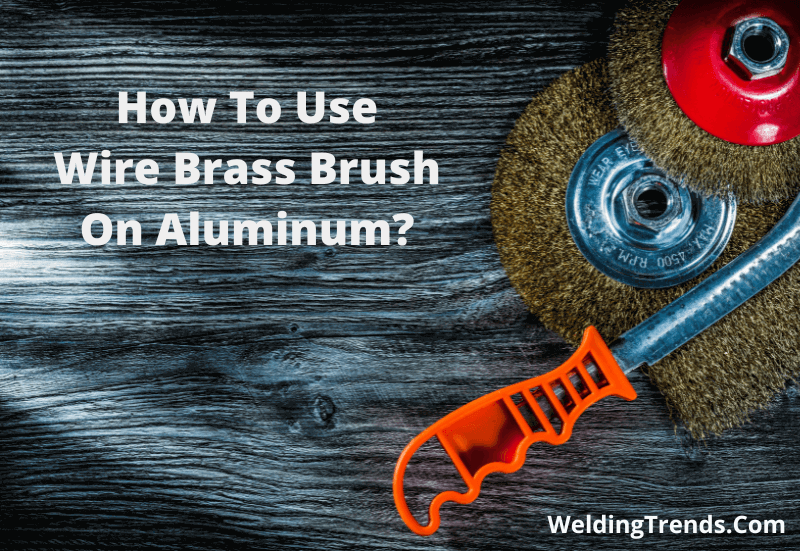A brass wire brush is a popular tool for cleaning corrosion and dirt from aluminum. But does it scratch the surface?
The short answer is yes, a brass wire brush will scratch the aluminum. However, the severity of the scratches will depend on a few factors including the type and aggressiveness of the brush, as well as how much pressure is applied.
In most cases, light scratching can be removed with some mild buffing or polishing; more severe scratching may require a little more work. If you’re not sure whether your brass wire brush will scratch aluminum, it’s best to test it on a small patch first.
Why Do You Use A Wire Brush On Aluminum?
There are a few reasons you might use a wire brush on aluminum. The most common is to remove corrosion or dirt.
Aluminum is a highly reactive metal, so it’s prone to corrosion. This is especially true if the aluminum is exposed to salt water or other corrosive materials. A wire brush can help remove some of the corrosion before it has a chance to eat away at the metal.
Wire brushes are also effective at removing dirt, grime and other build-up from aluminum surfaces. This can be helpful if you’re trying to restore an old piece of aluminum furniture or equipment.
Finally, some people use wire brushing as a way to create a textured finish on aluminum. This can be useful for aesthetic purposes or for increasing the surface area to promote adhesion in industrial applications.
Will a brass wire brush scratch aluminum?
Yes, a brass wire brush can scratch the aluminum. You should be careful when using a brass wire brush on aluminum because the softer metal can easily be scratched. If you must use a brass wire brush on aluminum then try to use a softer brush like a nylon brush.
Only use as much pressure as necessary and avoid scrubbing in a circular motion. Instead, scrub back and forth or up and down to minimize the risk of scratching. If you can, buff or polish the aluminum afterward to help remove any scratches.
What Type Of Wire Brush Is Used For Aluminum?
The different types of wire brushes are nylon, stainless steel, and brass.
Each type of brush has different benefits and drawbacks that you should consider before using them on aluminum.
1) Nylon brushes
Nylon brushes are the softest type of wire brush and will not scratch aluminum. However, they may not be as effective at removing corrosion or dirt.
2) Stainless steel brushes
Stainless steel brushes are more aggressive than nylon brushes but can still scratch aluminum if used incorrectly. Use light pressure at first and then increase to achieve the desired finish. Scrubbing in a circular motion is not recommended.
3) Brass brushes
Brass brushes are the most aggressive type of wire brush and can easily scratch aluminum if you’re not careful. Avoid using brass brushes on aluminum unless necessary.
If you must use a brass brush, To avoid scratching, start with a clean sponge.
Apply as much pressure as required and scrub back and forth or up and down to minimize the chance of scuffing. You may also want to buff or polish the aluminum afterward to help remove any scratches.
What are benefits of using a brass wire brush?
Following are the benefits of using a brass wire brush:
- It is a very effective tool for cleaning and polishing metals.
- Brass is a softer metal, making it less likely to scratch the surface of the item you are cleaning.
- It is also effective for removing rust from metal surfaces. Brass wire brushes are available in a variety of shapes and sizes to fit your needs.
- They can be used on a variety of surfaces, including wood and stone.
- Wire brushes are relatively inexpensive and last long if properly cared for.
For these reasons, brass wire brushes offer many advantages for cleaning purposes.
How To Wire Brush Aluminum?
Aluminum is a metal that is used in many applications because of its durability and corrosion resistance. When aluminum becomes corroded, it can be difficult to remove the corrosion without damaging the metal. Wire brushing is one way to remove corrosion from aluminum without damaging the metal.

Wire brushing on aluminum is a simple process that can be done with a few supplies. First, you will need to gather the following supplies:
- A wire brush made for aluminum
- Protective gloves
- Eye protection
- A bucket of water
- A clean cloth
After that, there are a few things to keep in mind when wiring brushing aluminum.
- First, it is important to use a brush that is made of aluminum.
- Second, the brush should be stiff enough to remove the corrosion but not so stiff that it will damage the metal.
- Third, it is important to move the brush in a circular motion to avoid damaging the metal.
How to Find Best Wire Brush For Aluminum?
When choosing a wire brush for aluminum, you should consider the type of brush, the aggressiveness, the size and price.
1) Type of brush
The type of wire brush you choose will depend on your needs. If you’re just trying to remove light corrosion or dirt, a nylon brush will be sufficient.
If you need to remove heavier corrosion or dirt, a stainless steel or brass brush may be necessary. Just be careful with brass brushes as they can easily scratch the aluminum.
2) Wire aggressiveness
The aggressiveness of the brush is also important to consider. A more aggressive brush will be able to remove tougher corrosion and dirt but is also more likely to scratch the surface. Start with a less aggressive brush and only move up if necessary.
3) Size of Wire brush
The size of the wire brush is also important to consider. A smaller brush will be able to get into tighter spaces but may not be as effective at removing larger areas of corrosion/dirt. A larger brush can cover more area but may be more difficult to maneuver.
4) Wire brush price
Finally, you should also consider the price of the brush. Wire brushes are inexpensive, so you shouldn’t have to spend a lot of money on one. Choose a brush that is both efficient and durable if you want it to last for a long time.
With these factors in mind, you should be able to find the best wire brush for aluminum for your needs. If you aren’t sure what to do, don’t touch it. Abrasive materials can damage the item if they are handled incorrectly or too much.
When To Use A Wire Brush For Aluminum Welding?
Wire brushes are often used during the preparation stage of aluminum welding.
The main purpose of using a wire brush is to clean the surface of the metal before welding. This ensures that there is no dirt, grease, or other contaminants that could prevent the weld from taking hold.
A wire brush can also be used to remove oxide buildup on the surface of the aluminum. This is important because oxide can prevent the weld from taking hold and can also cause porosity in the weld.
- To use a wire brush for aluminum welding, start by selecting the right type of brush. Nylon brushes are the safest to use since they won’t scratch the surface of the aluminum. Stainless steel brushes are harsher but can still scratch if you’re not careful.
- Next, attach the brush to a power drill or power tool. Slowly move the brush over the surface of the aluminum in a back-and-forth motion. Be careful not to press too hard as this can damage the surface.
- Finally, remove the wire brush and inspect the surface of the aluminum. If any areas still have oxide build-up, repeat the process until the surface is clean. Once the surface is clean, you’re ready to weld!
Wire brushes are a valuable tool for any welder, especially those who weld aluminum. By following the tips above, you can ensure that your wire brush lasts for years to come
Can you use a metal brush on aluminum?
Yes, you can use a metal brush on aluminum. Aluminum is a soft metal, so it’s easy to brush. Just be careful while using it because a metal brush can scratch the surface.
How do you clean dirty aluminum for welding?
The best way to clean dirty aluminum for welding is to use a wire brush. Any dirt, grease, or other impurities that may prevent the weld from forming should be removed using a wire brush.
Which metal is harder aluminum or brass?
Aluminum is softer than brass. This means that it’s more likely to scratch if you’re not careful while using a brush. However, both metals are still soft enough to be brushed without too much difficulty.
Is acetone good for cleaning aluminum?
Acetone can be used to clean aluminum, but it’s not the best option. Acetone is a strong solvent and can damage the surface of aluminum if it’s not used correctly. If you do use acetone, be sure to rinse the surface well afterward and dry it completely.
Wrap Up
Brass wire bristles will not scratch aluminum if used correctly, but care should still be taken to avoid any potential damage. Always test a small area first to make sure the brass bristles won’t cause any unwanted scratches on your aluminum surface.
But the difference in hardness between brass and steel means that a brass brush is much less likely to cause damage to aluminum than a steel brush would be. Using a brass wire brush on aluminum can help clean the surface of the metal and improve its appearance.
If you are still unsure, it is always best to err on the side of caution and use a softer brush.




